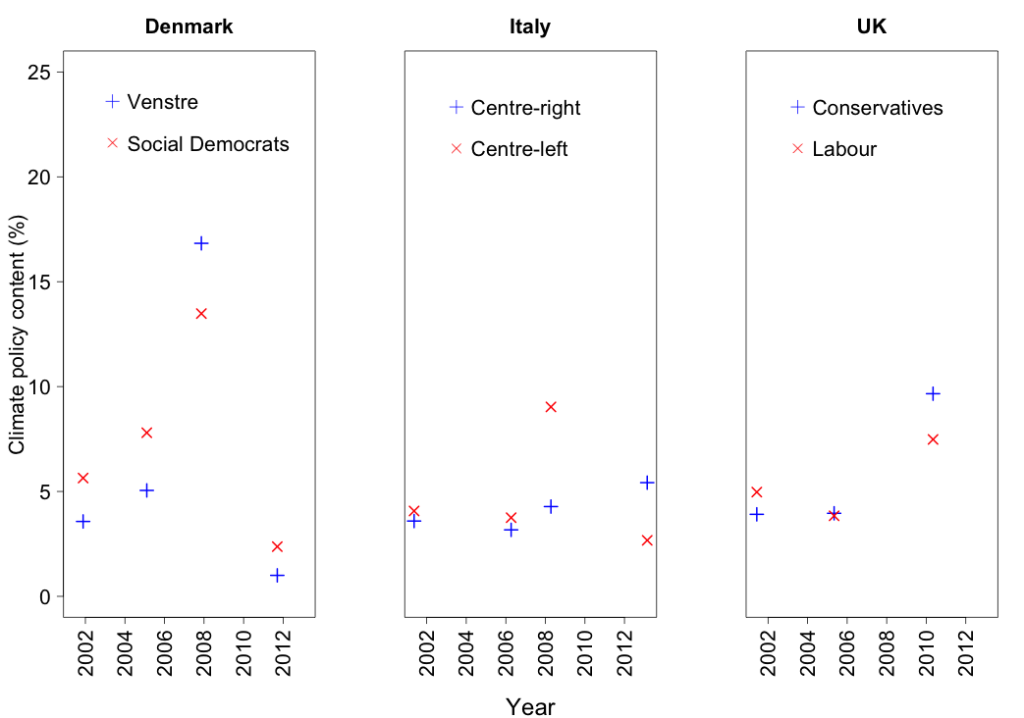Political parties have a key role in addressing climate change, but their responses to date have been constrained
Talks in Lima this weekend produced a global plan to tackle climate change in advance of next year’s Paris summit. Despite these periodic returns to the political agenda, parties in the UK continue to show varying degrees of interest and afford the issue differing levels of priority. Here, Conor Little discusses a project which looks at European parties responses to the issue, and argues that while parties do have a decisive role in addressing global warming, their responses are constrained by a number of factors.

Credit: Kabacchi, CC BY 2.0
The Intergovernmental Panel on Climate Change’s (IPCC) Fifth Assessment Report, recently completed with the publication of its Synthesis Report, highlighted a number of political implications of climate change, including increased civil war and inter-group violence due the exacerbation of the causes of those conflicts, increased poverty and migration and, potentially, increased rivalry between states. The reality and prospect of climate change will also have – indeed, is already having – an impact on the domestic politics of liberal democracies, at the centre of which are political parties.
The ESRC-funded Climate Policy and Political Parties (CPPP) project aims to describe the responses of mainstream political parties to the emergence of climate change as a major policy issue in several EU member states, and to identify the constraints and incentives that have shaped those responses. Although climate change is a global issue, we suggest that there are a number of reasons why parties’ responses to this issue at the national level are important.
First, parties’ positions influence government policy on climate change. We know this because of a growing set of systematic comparative studies and in-depth case studies that examine shifts in government policy that have followed changes in the partisan composition of government. Policy change that followed the centre-right National Party’s success in New Zealand in 2008 is one instance of this. At the international level, many of the leaders who attend global summits on climate change are representatives not only of governments, but also of political parties, and this is reflected in the negotiating positions that they take and in their ratification of international environmental agreements.
The second reason for studying parties’ positions on climate policy is their importance for the public’s attitudes and behaviour, which in turn matters for climate change policy outcomes. Greenhouse gas emissions are not just a result of government policy or, indeed, of the policies of ‘big business’. They also result from consumer behaviour: how we consume (which modes of transport, which foods, which energy sources) and how much we consume. We know from studies of public opinion on climate change and on other issues, such as EU integration, that parties don’t just follow public opinion; they also lead and shape it. Moreover, as governors and prospective governors, parties may provide certainty (or uncertainty) regarding future government policy, which in turn informs investors’ decisions.
Third, parties influence one another, shaping the ‘menu’ that is presented to voters at election time. In the years before the UK general election in 2010, for example, Labour, the Conservatives and the Liberal Democrats aimed to outdo one another on climate policy.
Fourth, political parties matter because of the dual role that they play in modern democracies as governors and representatives. If policy change of the scale recommended by the IPPC WG III contribution to this year’s Fifth Assessment Report is to take place, parties will play an essential role in representing citizens’ interests in these processes of change and in communicating the reasons for these policy changes to citizens. Parties will continue to be indispensable for democracy in a period of far-reaching policy change.
Research carried out to date by the CPPP project has found that mainstream political parties have been constrained by a number of factors from devoting significant attention to climate change and developing strong policy positions on climate change mitigation. In an initial paper focusing on the two largest parties in Denmark, Italy, and the UK, we have measured the proportion of election manifesto content that indicates support for policies that would, if implemented, mitigate greenhouse gas emissions. Figure 1 shows that while mainstream parties have occasionally devoted substantial attention to climate change mitigation policies in recent years, these episodes have been the exception rather than the rule.
In the Danish centre-right and centre-left and in the Italian centre-left Partito Democratico (PD), increased attention to climate policy in 2007 and 2008, respectively, has not been sustained through the economic crisis, while in the UK it seems that something similar has occurred since the 2010 general election, with climate policy falling down the main parties’ agendas in recent years.
Figure 1) Pro-climate policy content in party manifestos, 2001-present
This graph is based on draft data, which is presented in a recent paper by Neil Carter, Robert Ladrech and Conor Little. The paper provides more details on the data and findings reported in this blog post.
From case study research that involved speaking with key individuals in parties and in environmental NGOs, business representative organisations and trade unions, and from studying the events surrounding these elections, we have identified a number of constraints that may help to explain their typically weak positions on climate change.
Some of these relate to these parties’ need to compete for votes. Although public demand for climate policy varies between countries (it has been higher in Denmark than Italy, for instance) and over time, it is generally true that public concern about climate change and public demand for a political response to climate change has been relatively low. Moreover, while climate policy has typically been assimilated into the left-right pattern of electoral competition that characterises these countries’ politics, it has not typically been adopted as a high priority by either voters or parties on the centre-left or the centre-right.
An important obstacle to several of these parties developing a strong climate policy response, however, appears to have its origins inside the parties. Internal party groups on the centre-right and the centre-left have constrained their parties from developing their climate policies further. For example, Silvio Berlusconi’s centre-right parties have hosted a vocal and active constituency that rejects the science of climate change and actively opposes climate policy, while the UK Conservatives also host a climate-sceptical wing. Internal constraints work together with external interests: important factions within the Italian centre-left, for instance, have strong links to the formerly state-owned energy companies, which have invested heavily in fossil fuel-based energy production.
When climate policy has been given higher priority by these parties, it has resulted from a range of factors. A need to ‘modernise’ parties’ images in the face of poor electoral performances drove policy change in the Italian centre-left in 2008 and in Cameron’s Conservatives in the lead-in to the 2010 election. Where important business interests have seen opportunities rather than threats in the development of green industries (e.g., in Denmark), this appears to have had a significant effect on party policies. And the role of influential individuals with an opportunity to drive policy change and a personal commitment to climate policy should not be discounted. They have included David Miliband in Labour, Connie Hedegaard in the Danish centre-right (albeit from outside the main centre-right party Venstre) and Walter Veltroni in the Italian PD.
Finally, the ebb and flow of attention to climate change by political parties has corresponded with external events. Interest in climate policy hit a peak in the late 2000s, with the publication of the Stern Report and the release of Al Gore’s An Inconvenient Truth in 2006, the publication of the Fourth Assessment Report of the IPCC published in 2007 and the lead-in to the UN Climate Change Conference in Copenhagen in 2009. These events influenced public opinion, which in turn provided an incentive for political parties to develop their positions on climate change mitigation. Conversely, with the failure of the Copenhagen Climate Conference and with the onset of the economic crisis, the salience of climate policy plummeted.
With scientists again highlighting the need for policy changes and the Paris Climate Conference coming up at the end of 2015, climate change is again climbing the media and political agendas. And in countries like the UK and Denmark, where there will be general elections next year, this means that there is a possibility that international climate politics will connect with domestic politics once again. The stakes of party politics are, as always, high, and the positions that parties take will influence government policy, public opinion and patterns of party competition.
The Climate Policy and Political Parties project is hosting a one-day workshop on the theme The politics of climate change. Parties, elections and climate leadership on Friday 30 January 2015 at Friends House in Euston, London, with the participation of policymakers and researchers. For more information, or if you would like to attend, contact us at contact[at]climatepolitics.eu.
—
Note: this post represents the views of the author and not those of Democratic Audit or the LSE. Please read our comments policy before posting.
—
 Dr. Conor Little is a participant in the ESRC-funded Climate Policy and Political Parties project. He is currently a Postdoctoral Researcher at the University of Copenhagen.
Dr. Conor Little is a participant in the ESRC-funded Climate Policy and Political Parties project. He is currently a Postdoctoral Researcher at the University of Copenhagen.






 Democratic Audit's core funding is provided by the Joseph Rowntree Charitable Trust. Additional funding is provided by the London School of Economics.
Democratic Audit's core funding is provided by the Joseph Rowntree Charitable Trust. Additional funding is provided by the London School of Economics.
[…] I’ve written a blog post for the LSE-based Democratic Audit website that summarises some of the work that my colleagues and I have done on the ESRC-funded Climate Policy and Political Parties project. […]
Climate change talks in Lima were a success, but what role do domestic political parties play? https://t.co/p0ObGVzQD3 https://t.co/YoTyCzd4tz
Great piece by @conorlittle about the role of domestic political parties in tackling climate change: https://t.co/BkCnvaN58L @democraticaudit
RT @democraticaudit: Political parties have a key role in addressing climate change, but their responses to date have been constrained http…
Political parties have a key role in addressing climate change, but their responses to date have been constrained https://t.co/Lkf2xxyK6F
Parties have key role in addressing climate change, but so far responses have been constrained https://t.co/TAzYtdCazJ https://t.co/ref7wmp0IL
Political parties have a key role in addressing climate change, but their responses to date have been constrained https://t.co/WTkReoTpFI